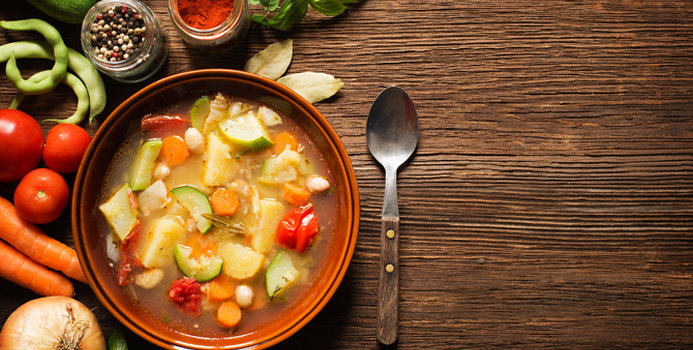What more could you ask for than a steamy bowl of hot soup on a cold winter day? It sounds like a perfect meal on a chilly afternoon. But one thing we keep hearing from the health experts all the time is that canned soups are unhealthy and the best way to savor a hearty soup is to make your own at home. It's absolutely true, home-made soups are the safest and the healthiest. But what would be a not-so-bad alternative for those who are in a time pressed situation or for someone who is not very "kitchen-friendly?" Can you pick a ready to eat soup that can actually get a green signal from a health practitioner? Why are canned soups black listed by most of the health advocates?
Reason #1 Canned soups contain BPA.
BPA (Bisphenol A) is found in varied amounts in lot of products ranging from baby foods and water bottles to canned foods and cosmetics. It is used in the food can liners and so is found in all the canned foods in smaller or larger amounts; but more so in the liquid canned foods such as juices and soups. BPA has been linked with causing breast and pancreatic cancer and also diabetes, birth defects, early puberty, behavioral complications, etc. One solution to this problem is to look for BPA-free cardboard carton packed organic soups in your local supermarket. Dr. Mcdougall organic veggie soups is one such example. But many foods that say "organic" and "BPA-free" may still contain this chemical in smaller amounts. But it's still a better deal compared to the regular canned soups, as the amount of BPA content in cartons is comparatively negligible.
Reason #2 They are high in sodium.
Sodium isn't bad but the excess of it, like any other nutrient, will cause health complications. High sodium intake leads to increased blood pressure, heart problems and also causes water retention and thus, weight gain. So it is important to keep a check on our sodium intake. And soups are high in sodium, period! Many of the soups that claim to be low sodium contain 460-480 mg of sodium which is about 20-22% of daily value. Daily requirement of sodium is 500-1000 mg, which is like 1/2 to 1 tsp a day, while an average American tends to have almost 3-10 times of this amount. Note: typically, veggie soups contains less sodium than the meat based soups. The best option here would be to use half of the serving of the (BPA-free, organic) canned veggie soup, bring it to boil, dilute it with water and add extra non-salt flavorings of your choice, toss in some organic chicken or turkey chunks for extra protein or freshly cut veggies like celery, carrots and broccoli to it. You will still get the base taste of the canned soup but just in a more nutritiously safe version.
Takeaway:
Buy low sodium, BPA-free veggie based organic soups. Use half of the serving at a time and customize it to suit your taste buds. Remember, Moderation is the key!
Prachi Baxi has a double masters degree in Clinical Nutrition and Public Health Nutrition, she is a Nutrition Specialist certified by the American College of Nutrition and a Certified Yoga Instructor. Her immense experience in the field of Ashtanga Yoga coupled with her Nutrition knowledge she helps people who need to and want to change their way of life, become fit and discover their newer selves. She is a Fitness Counselor who has a passion for life and teaches yoga with intent and compassion. Prachi can be reached via email at [email protected].



